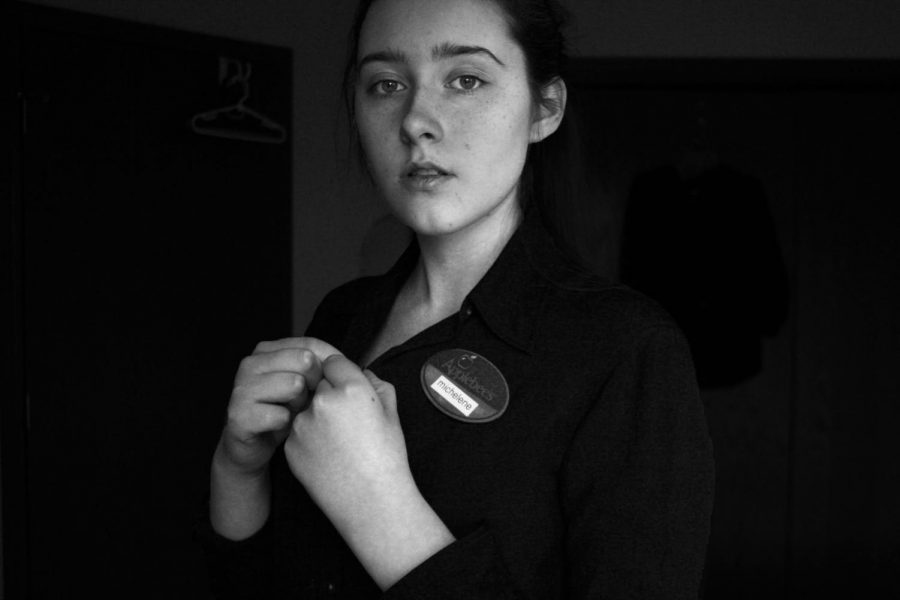Essential
Some MCHS students are considered essential workers during the COVID-19 crisis
Though most people are practicing social distancing by working at home, others considered “essential” still have to head to work every single day, including students at MCHS. But many teenagers don’t feel safe working at the frontlines of a global pandemic.
April 15, 2020
An MCHS student lets out a shaky breath as she pulls her ponytail through the opening in the back of her uniform hat. As she pulls a blue latex glove over her freshly-washed, frail fingers, she closes her eyes and whispers prayers to keep her healthy and safe. She clocks into her shift and places a headset over her head. Then, she takes one last deep breath, presses a button, and hides her fear as she says into the microphone, “What can I get for you today?”
During this pandemic, while most people self-isolate at home, others still do their job every single day. Healthcare workers, fast food crews, and essential retail stores deserve all the praise they are receiving and more for the risk they are putting on themselves in these hard times to make sure that others are well taken care of. When one pictures these essential workers, adults come to mind, but many of these essential workers are among the student body at MCHS.
“To be honest, I feel helpless,” said senior Bre Darcy, who works at Ace Hardware. “There was a customer at my work who very confidently asked me ‘so, how does it feel to be essential?’, and then went on to tell me that all Ace employees should be working. And I just stood there because I don’t really know how to feel. I know I should work because it’s the right thing to do in this worldwide effort right now, but at the same time when you really think about it, is a low-paying cashier job as a 17-year-old really worth risking my health, and possibly my family’s?”
Because these workers have put themselves on the frontline to provide services during this pandemic, and the best way to protect those essential workers is by staying home unless it is absolutely necessary. The fear that some workers have of getting infected themselves while helping others is on their minds.
“I’ve definitely been nervous,” explained senior Trent DeSanctis, who works at McDonald’s. “I know I more-than-likely wouldn’t die or be severely affected, but what if I transmit it to someone that would die? That’s what scares me.”
“I sometimes get scared about going to work because of the large amounts of people I interact with within a day, and anyone could have it and not know,” adds junior Cheyenne Plasky, who works at Jewel. Although she is scared, she still feels as though she is accomplishing something much larger than her fear. “I feel pretty important right now. I am helping people get the essentials they need to stay healthy and safe.”
These minimum-wage workers have been under the spotlight since being deemed essential, and for good reason. By doing what they do day-to-day, they are lending a helping hand in flattening the curve.
“I feel a bit more valued [at my job]. I mean, it’s not anything drastic, but it does actually feel like I’m there for a reason now,” DeSanctis claimed. “I’ve had healthcare workers come through the drive-thru and thank me for still coming to work, and helping keep the place open because it’s their only place to eat since their food court was shut down.”
Most if not all essential businesses have either altered or added new policies in order to keep both the workers and customers safe, including enforcing workers to wear gloves/masks, plexiglass shields, changed hours, closed dining rooms, and enforcing the six-feet-apart rule.
“All customers have to be six feet away, all aisles are one-way so no customers cross each other’s paths, and we aren’t allowed to use reusable bags,” Plasky explained.
“Our hours got cut, but I am honestly glad about it because Ace is so busy now that a 4-hour shift really feels like an 8-hour shift,” Darcy said. “ We also do curbside ordering. A lot of my shifts are hectic and constantly busy because we do online orders and over the phone payments. Also, on Thursdays, we get shipments of masks so it’s insane.”
Essential workers risk their own health every day in order to provide for and help others during these troubling times. These selfless acts are just everyday tasks for these workers, just with a bit more chaos.













